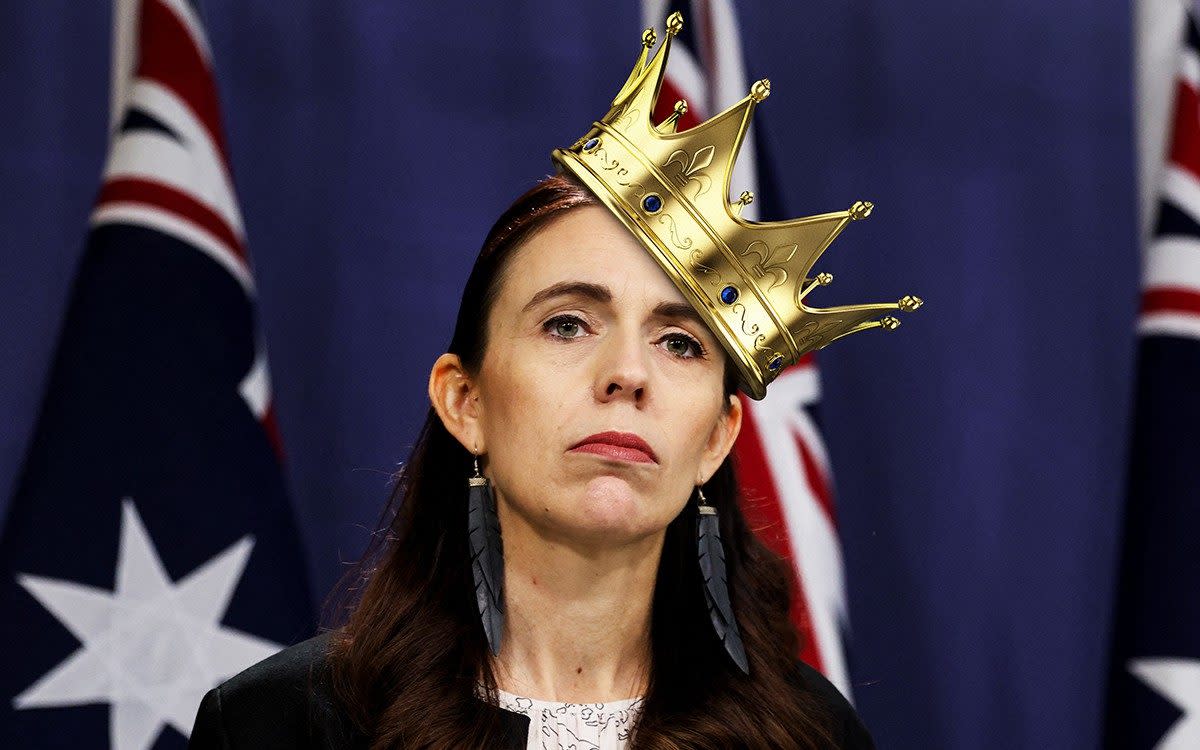In New Zealand, our love affair with Jacinda Ardern is coming to an end

My local liquor store here in the New Zealand capital has done up its floor-to-ceiling glass storefront just in time for the Christmas rush. Rather than decorating it with pictures of Santa and his reindeer, however, the retailer has gone for a rather more minimalist look of heavy iron sheeting.
The Cellar Room in Brooklyn, Wellington, is one of the hundreds of local businesses to have been targeted in recent months by nocturnal joyriders ploughing stolen cars into retail outlets and plundering their shelves.
As bruising as these crimes have been for retailers, they are now wreaking almost as much havoc for the popularity of the once-unassailable Labour Party government of Prime Minister Jacinda Ardern, who recently admitted that "there is no question it is a difficult time” for her to be in office.
Ardern, who began this year looking forward to the start of her own marriage, now ends this year contemplating the end of a remarkably long political honeymoon. Already there is a stark contrast between her mild demeanour at the beginning of her office and now: this week she made headlines after being caught calling her rival David Seymour, the leader of the Right-wing ACT party, an “arrogant p—k”. She later sent an apology to Seymour.
Ever since taking her party to victory in 2017, the 42-year-old premier’s popularity abroad - and at home - has almost been without precedent for a leader of this island nation.
The most recent New Zealand general election, in 2020, saw her positively stomping back into office. Labour won an outright majority of parliamentary seats, an unheard-of achievement under the country’s convoluted mixed-member proportional representation voting system, which typically requires fiddly coalition deals to be stitched up with smaller players in order for any major party to form a government.
In addition to the natural charisma Ardern first politically honed in London, as a researcher working for Tony Blair’s Cabinet office, her stratospheric electoral success rode on a widespread perception — good luck and good geography be damned — that she had managed the near-impossible in keeping Covid at bay from her self-declared “team of five million”.
But the odds of a repeat performance in the next election are becoming scanter with the appearance of each new dismal political poll.

In the latest, released this week, Labour was down to 33 per cent support among the team of five million, its lowest level since 2017. Even with the backing of its likely coalition partners, the Green Party and the Maori Party, those numbers would leave the incumbent unable to stitch together a workable ruling coalition in the 120-seat parliament here in Wellington.
The opposition National Party, along with its libertarian allies, the Act Party, would handily be able to muster a governing majority.
The conservative bloc is led by a relative political newcomer, the onetime Air New Zealand chief executive Christopher Luxon, whose own personal popularity remains a little shaded by his opposite number.
Luxon is no orator and certainly not encumbered with the true believers of the Ardern coterie. Nevertheless, he has seen his party’s fortunes surge on the back of an oft-repeated line — pressed into service again this past week — that "New Zealanders feel the country's going in the wrong direction".
Retail crime is only the most obvious of the immediate problems.
Ram raids are hardly unique to the South Seas, Britain having grappled with the same issue as well in recent times. In the UK, however, these are more often about high-end luxury goods, rather than the liquor stores and retail outlets, pillaged for their booze and tobacco (the second-most expensive in the world to purchase legally).
But it’s the numbers themselves which are more significant. More than 515 vehicular smash-and-grabs have taken place this year, the equivalent of 6,500 incidents taking place in a country like Britain. This is a crime that was virtually unheard of here five years ago.
Part of the problem, critics charge, is that Ardern’s government let the cat out of the bag three years ago, when police were barred from pursuing any offender short of those letting off firearms. The policy shift effectively greenlighted anyone with a stolen car at their disposal to loot with virtual impunity.

Elsewhere, Labour also finds itself grappling with an array of economic problems faced by governments in many countries that spent heavily during Covid.
By some measures, its performance hasn’t been too bad. Inflation may be at its highest in a generation in New Zealand, for example, but at 7.2 per cent it could be a lot worse. The same goes with cost-of-living pressures.
One striking difference in the Kiwi scene has been the abrupt end to a sustained property boom that, until recently, had house prices in this city of 350,000 eclipsing those in many parts of London.
The popping of the property bubble has taken the country from being one of the world’s most overheated residential markets to one of the worst-performing.
As house prices have tumbled, interest rates have shot up, leaving thousands of owners of new homes in negative-equity.
It could also be that people are simply weary of the toothily telegenic Ardern, and her oft repeated line, that she and her government still possess the "experience of tough times" to bring her nation through this Southern Hemisphere summer of discontent.
Back when Covid struck, Ardern’s government relentlessly pursued its elimination policy, initially to near-universal applause, for more than two years. Then, Ardern’s style of decisive leadership was often favourably contrasted with the somewhat slower response of a seemingly nonplussed Boris Johnson.
A year ago, barely two-dozen souls in New Zealand had perished with the virus.
Yet even after it became obvious that the jig was up, with the arrival of Omicron, and a galloping death toll to go with it, the government persisted for quite a while longer with its Antipodean version of zero-Covid to increasingly thinner returns.

Urban centres such as Auckland stayed locked down for a long time. Virtually all travel in and out of New Zealand remained frozen. Shops and businesses in once-bustling entertainment districts in the major cities, that used to hum with tourists and foreign fee-paying students — vital sources of revenue in this export-led economy — have been silenced, save the clicking of hundreds of keys in the ignitions of stolen cars.
Will Ardern put paid to the bandits? One local fan, cinematographer Thomas Burstyn, said her latest numbers were “disappointing”, but the prime minister remained that “rare thing” in world politics: a leader capable of admitting their mistakes and creatively moving on.
Another supporter, Michael Christoffel, a Wellington-based designer, notes that Ardern still has the trump card of having managed the economy through the pandemic solidly enough, with new trade deals with the UK and the EU to show for it.
“But you're only as good as your last crisis, and the general problems besetting the world economy and its governments are definitely hitting Ardern,” Christoffel adds. Perhaps she might not pull off another victory in 2023, “but if she can kill some of the unpopular policies, she has an outside chance.”
No doubt, Ardern wishes as much for the coming year, during which her marriage to long-term partner, which was put on hold because of the pandemic, will take place too.
As the wedding bells sound, the hope must be that the richly rewarding love affair she once enjoyed with her electorate will somehow be rekindled as well.

 Yahoo Movies
Yahoo Movies 
